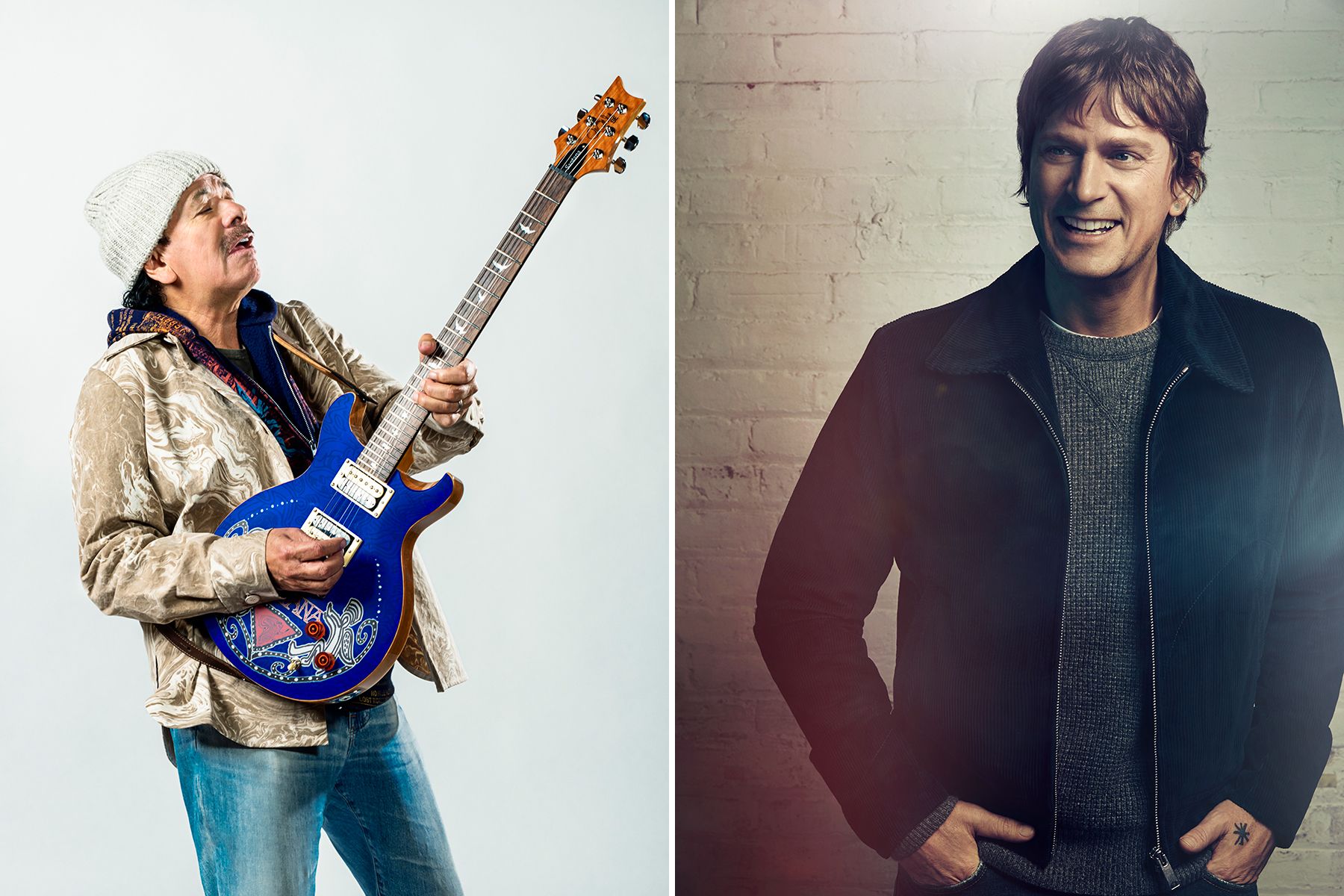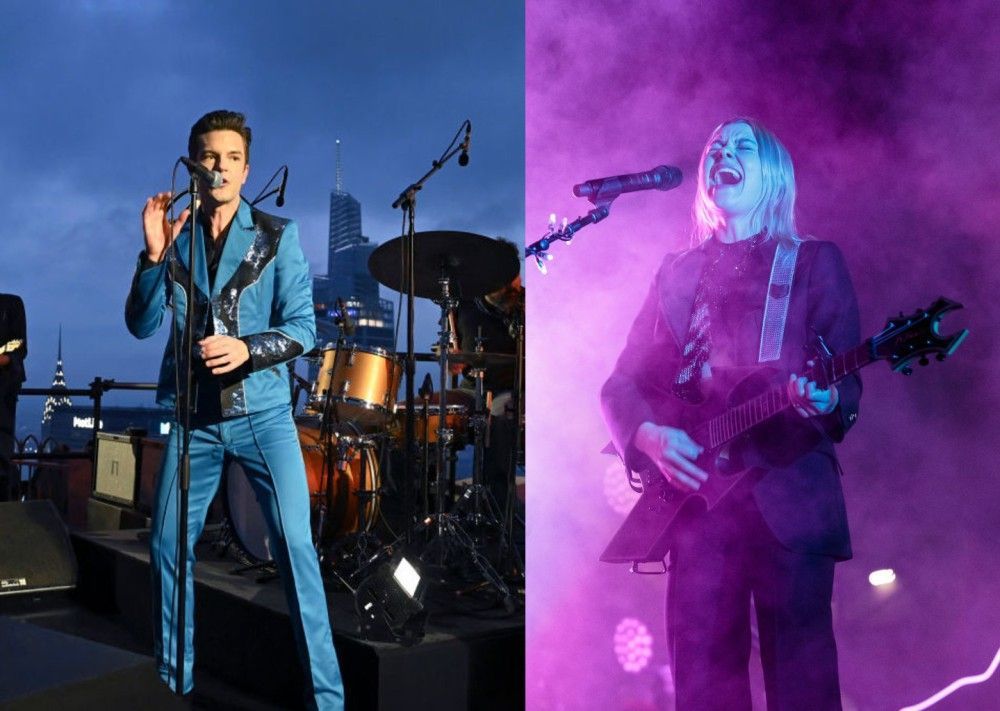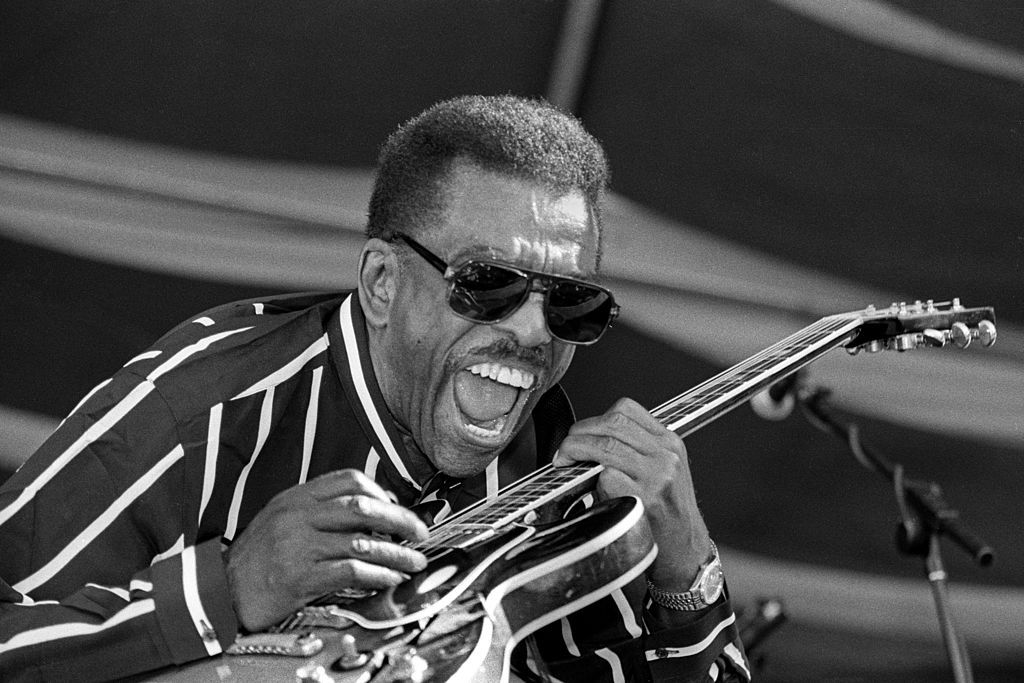
Carlos Santana and Rob Thomas Are Together Again. It Only Took 22 Years
Twenty-two years ago, no one could avoid “Smooth,” that unlikely combo of Carlos Santana and Rob Thomas that won multiple Grammys, sold millions, and haunted all of us at weddings. But neither man seemed to take the idea of a sequel all too seriously. “We always talked about doing something,” Thomas says. “Usually I’d get a text from Carlos at 3 in the morning with Otis Redding doing ‘Day Tripper’ and Carlos saying, ‘We’re gonna do this song!’ It was always two guys drinking too much wine and having a conversation about music: ‘We’re gonna start a band!’”
In the years since 1999, Thomas wound up co-writing a few songs on Santana albums that followed Supernatural, although he never sang on any of them. But that changes this week. Santana’s new Blessings and Miracles, out in October, marks a return to the guest-singer franchise of Supernatural and Shaman: This time, the drive-bys include Steve Winwood, Chris Stapleton, Diane Warren, Living Colour’s Corey Glover, rapper G-Eazy, and Death Angel’s Marc Osegueda, along with instrumentalists like Metallica’s Kirk Hammett and the late Chick Corea.
And for those who’ve been hankering for a Thomas-Santana rematch, that’s here too, for the first time since Bill Clinton was president. Cowritten with members of American Authors, “Move” — a mashup of arena crunch, metal and Latin groove — marks the reunion of Santana’s guitar and Thomas’ voice, and accidentally at that, Thomas says. “It has the DNA of ‘Smooth’ with Carlos’ guitar and my voice,” Thomas says, “but it started from another source. It was a complete accident.”
Santana admits that the all-star tactic behind Blessings and Miracles came in the aftermath of Africa Speaks, his less commercial, Rick Rubin-produced album from 2019. “We did 49 songs in 10 days,” Santana recalls, “but as Clive Davis would say, there was no single in sight within 1,000 miles. And I said, ‘Why don’t we try to get back to what Clive made us focus on, to create songs and not just moods?’”
As with Supernatural, Santana admits the new album was “orchestrated by the right intelligence behind the scenes,” in this case a think tank of people on his team. “I said, ‘I need to get back on the radio. Can you guys help me out? Please give me names of people who have their finger on the pulse and get on the radio and are really in demand.’ They threw a lot of names at me.”
One name, he says, was modern honky tonker Chris Stapleton, an unfamiliar name to Santana. “They said, ‘He plays country,’ but I said, ‘Why don’t we call his manager and see if Chris would write a song with me?’” The result, “Joy,” is what Santana calls a “country-reggae thing.” After Warren contributed “She’s Fire,” Santana said he was considering Justin Timberlake to join in on the slinky R&B track, but left it up to Warren in the end; she suggested G-Eazy. “I met him on Zoom,” he says. “He’s very soulful and convincing.” (Since the album was made during the pandemic, Santana has not yet met at least half the guests on the album: “Eventually,” he says, “I will meet them in person.”)
The album also features a Latin-accented remake of Procol Harum’s “Whiter Shade of Pale,” sung by fellow veteran Winwood. That idea, Santana says, began when both men, along with Eric Clapton, played London’s Hyde Park in 2018. “I saw Stevie listening by the side of the stage and walked up to him and put my mouth almost to his ear,” he says. “I said, ‘Hi, Stevie,’ but he was really focused on the music and didn’t turn around. I said, ‘I hear you singing “White Shade of Pale,” doing it more like Mongo Santamaria, more “Spanish Harlem” style.’ He wouldn’t turn around, but all of a sudden he got up and said, ‘Carlos, I hear it!’ Sometimes you just plant the idea.”
Several of the songs, including “America for Sale” and “Vibe Power,” originated on the Africa Speaks album but were “transformed,” Santana says, with added cameos. The former, a full-on metal assault featuring a vocal by Osegueda and a Santana-Hammett guitar face-off, was originally earmarked for Steven Tyler. “But he was really busy or wouldn’t respond, so we called Marc, who is a great friend of Kirk’s,” Santana says. “I was hearing that kind of voice anyway, like AC/DC, that roar. He was like, ‘No problem!’”
The making of “Smooth” was a complicated affair; the song was rewritten several times before it reached Santana, who, after some initial reluctance about the song and Thomas, agreed to cut it. Industry hassles — each man recorded for a different label — also threatened to derail it at various points.
By comparison, they say, “Move” was a relatively straightforward experience. For a forthcoming solo album, Thomas had been writing songs with American Authors’ Zac Barnett, Dave Rublin and Matt Sanchez. At the end of one writing session, those three passed along an instrumental track to Thomas, which took him aback: “It had that Latin flair to it, which I wasn’t expecting from them. They didn’t have [him or Santana] in mind when they did it.” Thomas decided to finish it up and then asked Santana to add a guitar part. Although Santana hadn’t been taken with the earliest incarnations of “Smooth,” he had no such qualms this time. “Rob was working on it and wanted to know if I would play on it,” he says. “And as soon as I heard it, I said, ‘This is a powerful summer song.’”
But Santana had other plans as well. The track, which also features members of Santana’s band as well as American Authors on vocals, was originally intended for Thomas’ album – until Santana asked if he could have it for his record and make it the first single. “People at Atlantic [Thomas’ label] were excited about it and we like the song, but Rob was still working on his album and we like Carlos and wanted to help him,” says Pete Ganbarg, president of A&R at Atlantic (and the same exec who put together “Smooth”). “We didn’t want to put up a roadblock and hinder him from putting this out.”
One possible link between the two songs is Thomas’ wife Marisol, who inspired “Smooth” and may have also provoked the lyrics of “Move” (“the way you pull me in close / you got a spell on my soul”). “I can’t say,” Thomas says, “other than the fact that my wife is a fuckin’ smokeshow and is Latin. There’s always something there. She’s always amused that if I’m talking about a sexy woman, it’s always about her.”
Although it’s easy to imagine the pressure both must have felt in following up “Smooth,” both say they never felt under the gun. “You don’t want to let people down, but some of that pressure is off,” Thomas says. “There’s a whole generation of people who don’t know ‘Smooth.’ I was watching a video of 15-year-old kids hearing it and going, ‘What the fuck is this?’”
“I don’t know that word ‘pressure,’” Santana adds. “The only time I would utilize that word is to remember that charcoal turns into a diamond by pressure. I’m not into comparing or competing or living up to anyone’s expectations or entitlement. I don’t like those words.”
Right now, both men are planning to play both “Smooth” and “Move” at this Saturday’s “We Love NYC” concert in New York’s Central Park, on a bill that also includes Bruce Springsteen, Paul Simon, Jennifer Hudson, LL Cool J, Elvis Costello and many others. And especially in that context, everybody involved is steeling themselves for the comparisons. “Are people going to say, ‘Let the party continue!’ or, ‘Hey, guys, you did this before!’?” says Ganbarg. “But the legacy of ‘Smooth’ is that it makes people feel good and puts a smile on people’s faces. When I listen to this song, I have the same feeling — and who doesn’t want to feel like that again? Who doesn’t want some 22-year-old nostalgia in these troubled times?”
“‘Smooth 2′ is going to be said a lot,” Thomas acknowledges. “There is always this fear that people will think this was contrived, that we were sitting in a laboratory somewhere trying to recreate ‘Smooth.’ After 20 years, hopefully we’ve shown we don’t have that kind of motivation. It had to happen organically, like it did now.”




